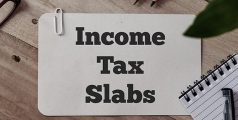
6 Ways to Save Income Tax Under the New & Old Tax Regimes for FY 2024-25
Posted on Monday, July 29th, 2024 | By IndusInd Bank
Budget 2024 has introduced three major changes that make the new, simplified income-tax regime more appealing. Do you know what they are? Finance Minister Nirmala Sitharaman has revised the income tax slabs, increased the family pension deduction to ₹25,000 from ₹15,000, and increased the standard deduction to ₹75,000 from ₹50,000 in the new tax regime.
Salaried individuals may now find the new tax regime more advantageous unless they qualify for deductions up to ₹2 lakh on home loans, up to ₹75,000 on health insurance premiums, up to ₹1.5 lakh under Section 80C investment products, or receive considerable House Rent Allowance (HRA). Without these tax deductions, the old tax regime offers fewer benefits.
In simpler words, the old tax regime may be beneficial to you only if you make certain investments, pay premiums, or pay Equated Monthly Instalments (EMIs) of specific loans like home loans or education loans.
So, to save income tax, you have two routes: either make investments to claim deductions through the old tax regime or make no investments and simply claim the direct standard deductions and other benefits offered by the new tax regime. Continue reading to learn about six prudent ways to save income tax for FY 2024-25.
Go for the Old Tax Regime if You Can Claim Multiple Tax Deductions
The old tax regime is best for individuals who can take benefit of various tax deductions available. These deductions are in the form of investments in the Equity-Linked Savings Scheme (ELSS), Public Provident Fund (PPF), National Pension Scheme (NPS) under Section 80C, HRA, medical expenses under Section 80D, interest on home repayment, leave travel allowances (LTA), education loans (Section 80E), an additional ₹50,000 deduction in NPS under Section 80CCD (1b), and more. Such deductions effectively lower your taxable income, resulting in lower tax outgo.
Go for the New Tax Regime if You have a Lower Income with No Investment Claims
For those who earn less than ₹7 lakh, the new simplified regime offers a rebate, bringing down their tax outgo to zero. Salaried individuals earning up to ₹7.75 lakh will not have to pay any tax under the new regime, thanks to the higher standard deduction of ₹75,000.
In contrast, the tax rebate limit under the old tax regime is lower at ₹5 lakh and the standard deduction is unchanged at ₹50,000.
What are the Ways to Save Income Tax Through Deductions Available in the Old Tax Regime?
Saving income tax can considerably enhance your disposable income and help you invest in your future. Here are some effective strategies to lower your tax liability –
Maximise Section 80C Deductions
Under the old tax regime, you can invest up to ₹1.5 lakh in various instruments like National Savings Certificate (NSC), PPF, ELSS, Tax saver Fixed Deposit (FDs), and term insurance policies to save on taxes.
In case you are looking to invest in five-year tax-saver FDs to avail section 80C benefits, you may consider IndusInd Bank Tax-Saver FDs, which offer enticing interest rates. Other benefits include the option to open an account with a minimum investment of just ₹5,000, an instant and paperless booking process, and high financial stability and safety.
Home Loan Interest Deduction
In the old tax regime, you can avail up to ₹2 lakh on home loan interest as per Section 24 (b). This tax deduction is not available under the new regime, making the old regime beneficial for homeowners.
Health Insurance Premiums
Premiums paid on health insurance for self and family can save you tax as per Section 80D. You can claim up to ₹75,000 deduction on health insurance premium payment. For self, spouse, and dependent children, a deduction of up to ₹25,000 per year is allowed.
For parents (senior citizens – aged 60 and above), an additional ₹25,000 per year deduction can be claimed (₹50,000 in total), for parents (below 60 years of age), up to ₹25,000 per year (covered under your policy).
National Pension Scheme (NPS)
NPS is an excellent way to save for your retirement days while availing tax benefits. NPS allows you to claim an additional deduction of up to ₹50,000 under Section 80 CCD (1B). This benefit is over and above the deduction of ₹1.5 lakh available under Section 80C. By investing in NPS, you can avail extra tax-saving opportunities.
Education Loan Interest Deduction
The interest component paid on education loans can be claimed as a deduction under Section 80E. This deduction has no maximum limit and is available for up to eight years or until the interest is completely repaid, whichever is earlier. This can considerably lower the financial stress of higher education expenses.
Interest Earned on Savings Account
Under Section 80TTA, an interest component of up to ₹10,000 earned from all savings accounts is not taxable. To keep your savings and avail deductions and other benefits, you may consider opting for the Indus Multiplier Max Savings Account by the IndusInd Bank. This account comes with a smart-sweep feature that automatically converts balances over ₹20,000 into FDs, ensuring higher returns. Additional benefits include a 25% locker discount for the first year.
Also Read: Here’s All You Need to Know About the Auto Sweep Facility in Banks
Ending Note
Both the new and old tax regimes offer unique ways to reduce income tax. The choice depends on individual financial standing, and the deductions one can claim. Those looking for good, stable returns and a way to save tax under Section 80C and Section 80TTA through the old tax regime can consider opting for IndusInd Bank tax-saver FD and Indus Multiplier Max Savings Account, respectively.
Parking funds in both financial products may not just reduce tax liability but also help you grow your savings. So, do not wait – open your tax saver FD and savings account with IndusInd Bank and start saving on taxes.
Apply now!
Disclaimer: The information provided in this article is generic in nature and for informational purposes only. It is not a substitute for specific advice in your own circumstances. Hence, you are advised to consult your financial advisor before making any financial decision. IndusInd Bank Limited (IBL) does not influence the views of the author in any way. IBL and the author shall not be responsible for any direct/indirect loss or liability incurred by the reader for taking any financial decisions based on the contents and information.



 Offers
Offers Rates
Rates Debit Card Related
Debit Card Related Credit Card Related
Credit Card Related Manage Mandate(s)
Manage Mandate(s) Get Mini Statement
Get Mini Statement
 categories
categories Bloggers
Bloggers Blog collection
Blog collection Press Release
Press Release


